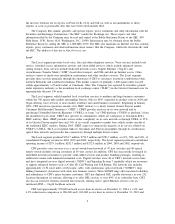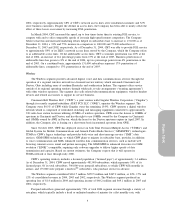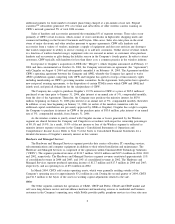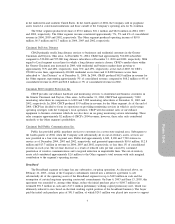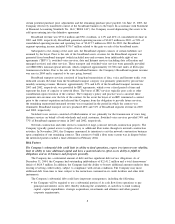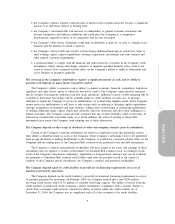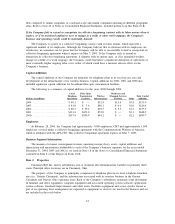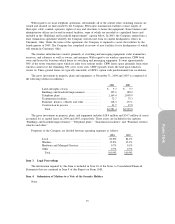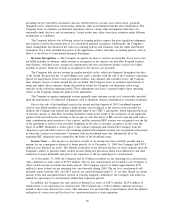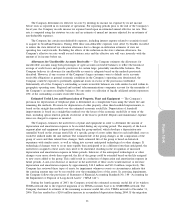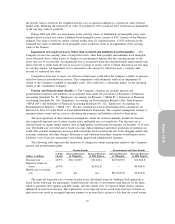Cincinnati Bell 2004 Annual Report Download - page 87
Download and view the complete annual report
Please find page 87 of the 2004 Cincinnati Bell annual report below. You can navigate through the pages in the report by either clicking on the pages listed below, or by using the keyword search tool below to find specific information within the annual report.
telecommunications industry. No assurance can be given that changes in current or future regulations adopted
by the FCC or state regulators, or other legislative, administrative, or judicial initiatives relating to the
telecommunications industry, will not have a material adverse effect on the Company’s business, financial
condition, results of operations and cash flows.
Failure to anticipate the needs for and introduce new products and services may compromise our success
in the telecommunications industry.
The Company’s success depends, in part, on being able to anticipate the needs of current and future
enterprise, carrier and residential customers. The Company seeks to meet these needs through new product
introductions, service quality and technological superiority. For example, in 2003, we began implementing the
Global System for Mobile Communications and General Packet Radio Service, or GSM/GPRS, technology.
GSM/GPRS technology provides enhanced wireless data and voice communications. We are also investigating
the implementation of the next generation of high-speed voice and data communications and entertainment
services. New products and services such as these and our ability to anticipate the future needs of our
customers are critical to our success.
Terrorist attacks and other acts of violence or war may affect the financial markets and the Company’s
business, financial condition, results of operations and cash flows.
Terrorist attacks may negatively affect the Company’s operations and financial condition. There can be no
assurance that there will not be further terrorist attacks against the United States of America, U.S. businesses
or armed conflict involving the United States of America. Further terrorist attacks or other acts of violence or
war may directly impact the Company’s physical facilities or those of its customers and vendors. These events
could cause consumer confidence and spending to decrease or result in increased volatility in the United States
and world financial markets and economy. They could result in an economic recession in the United States or
abroad. Any of these occurrences could have a material adverse impact on the Company’s business, financial
condition, results of operations and cash flows.
The Company could incur significant costs resulting from complying with, or potential violations of,
environmental and health and human safety laws.
The Company’s operations are subject to laws and regulations relating to the protection of the
environment and health and human safety, including those governing the management and disposal of, and
exposure to, hazardous materials and the cleanup of contamination, and the emission of radio frequency.
While the Company believes its operations are in substantial compliance with environmental and health and
human safety laws and regulations, as an owner or operator of property and in connection with the current
and historical use of hazardous materials and other operations at our sites, the Company could incur
significant costs resulting from complying with or violations of such laws, the imposition of cleanup
obligations, and third-party suits. For instance, a number of the Company’s sites formerly contained
underground storage tanks for the storage of used oil and fuel for back-up generators and vehicles. In
addition, a few sites currently contain underground tanks for back-up generators, and many of the Company’s
sites have aboveground tanks for similar purposes.
The Company could incur significant costs as a result of a number of putative class action and derivative
lawsuits that were filed against the Company.
During 2004, 2003 and 2002, a number of putative class action and derivative lawsuits were filed against
the Company and certain of its current and former officers and directors which allege a number of violations
of securities laws. The Company is vigorously contesting these matters, but such litigation could result in
substantial costs and have a material impact on the Company’s financial condition, results of operation and
cash flow. An adverse decision or settlement in any of these cases could require the Company to pay
substantial damages, which would have a material adverse affect on our business and operations.
The Company generates substantially all of its revenue by serving a limited geographic area.
The Company generates substantially all of its revenue by serving customers in the Greater Cincinnati and
Dayton, Ohio areas. An economic downturn or natural disaster occurring in this limited operating territory could
have a disproportionate effect on the Company’s business, financial condition, results of operations and cash
13
Form 10-K



